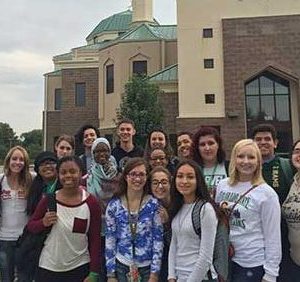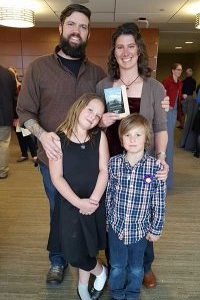As appearing in AlumLine
No one at Colorado State University is more committed to interfaith dialogue among students than Elizabeth Sink (M.A. ’06), special senior teaching instructor in the Department of Communication Studies.
As a 10-year veteran in teaching public speaking and a variety of other communication studies courses, Sink says she is attracted to studies in her discipline that bridge boundaries between strong ideologies. “I love to bring people into the room who think they are so different from each other,” Sink says. “Those are the starting points to work from to make the world a better place.”
Sink turned this passion into practice by helping to conceive and develop a new living-learning community for students called Key Interfaith Community, now part of the new Key Civic Community. Within these communities, a small, highly-diverse group of first-year students live together in a specific dorm and take most of their classes together while receiving mentoring and tutoring opportunities that help them succeed as CSU Rams.

The Key Interfaith Community, one of just a few of its kind at public institutions of higher education, launched in the fall of 2015. Other universities with similar programs include the University of Southern California, Los Angeles; the University of Nebraska at Lincoln; the Florida Institute of Technology, and Texas A&M.
Sink designed two courses for the community: KEY 192: Exploring Civic Interfaith Connections, and KEY 272: Interfaith Leadership. “I created these courses as a means to use civically-based higher education to increase student capacities to engage with others who orient around religion differently,” Sink says. “And also to help them critically review their perceptions regarding their own biased and/or polarized views.”
Sink points to the civil rights work of Martin Luther King Jr., Mahatma Gandhi, and Jewish leader Abraham Joshua Heschel as examples of individuals reaching out “beyond their turf and religious supporters” to make a difference. “Knowledgeable, respectful, and effective civic communication is possible, despite differing spiritual, philosophical, and religious values,” she says.
One major service learning project helped the 19 freshman who participated in the first Key Interfaith cohort learn how to reach across lines of difference. Partnering with CSU’s Hillel, Lutheran Campus Ministry, and the Geller Center, students were given the task of organizing an Interfaith Thanksgiving that offered a kosher, gluten-free meal (vegan options included) that was served to more than 160 people representing 16 different spiritualities.
According to Sam Desta, a Key Service Community Advisor, the project has led to an uptick in broader CSU and Fort Collins community investment in interfaith work and cooperation and helped inspire “Better Together Day,” which was held on the Lory Student Center Plaza in the spring.
“Pluralism is our mission; healthy communication is our practice, Sink says. Through respect for people’s diverse

religious and non-religious identities, mutually inspiring relationships between people of different backgrounds, and common action for the common good, Sink says that students can and do learn to move from conflict to cooperation.
Sink’s own pendulum-like experience with religion and ideology served as the catalyst for her interest in interfaith dialogue. As a young girl she was a devoted Catholic. She loved participating in ritual with others and working together to make the world a better place.
But, she says, her practice turned fundamental. She began to “pity” non-Christians and became, by her own admonition, “narrow-minded and narrow-hearted.” A de-conversion experience swung her beliefs the opposite direction, and today identifies as a Secular Humanist, who is deeply committed to reaching across faith and belief lines to create common ground.
Sink learned to “talk across party lines” as a CSU communication studies graduate student. She was heavily influenced by emeritus professor Dr. Cindy Griffin, who helped originate the concept of “invitational communication,” an approach that centers on understanding another’s perspective.
As the first graduate student to intern with the department’s Center for Public Deliberation, Sink found “a great deal of fulfillment in conversations that veer away from a winner-loser model, to one where greater understanding and respect is the goal,” Sinks says. She learned to “trust the discomfort of disagreement” while helping train other students to become facilitators.
Sink’s commitment to interfaith dialogue and service learning were recognized in spring 2016 when the Institute for Learning and Teaching (TILT) presented her with an Instructional Innovation in Service-Learning Award. Two weeks later, Sink was presented the Ann Gill Excellence in Teaching Award for Special Faculty, a recognition that she labels “one of the highest honors” she can ever achieve at CSU. And in March, she gave a TED Talk at TEDxCSU titled “Interfaith Cooperation: An invitation for all beliefs.”
“I have witnessed how adopting pluralistic communicative practices allows for softening instead of hardening of student’s perspectives, leading to more productive and cooperative work and partnerships, and the world needs more of that,” Sink says. It’s a lesson we can all learn from, especially during a contentious election year which raised issues that could be softened by honest interfaith dialogue.
An Invitation For All Beliefs
TEDxCSU, March 2016
A Beginner’s Guide to Interfaith Dialogue
Tips from Elizabeth Sink
Break Myths. Sinks advises against perpetuating the myth that all religions boil down to the same thing. Instead, seek to value the uniqueness of each tradition, as well as the different ways followers practice their traditions.
Respectfully Engage. Enter into conversations with those who orient around religion differently than you by:
- Possessing a healthy, self-critical perspective toward your own sense of spirituality.
- Making space for religious and non-religious perspectives.
- Listening with intention of understanding, not converting.
- Comparing your ideals to the ideals of others, your practices to other’s practices. Refrain from comparing your ideals with other’s practices.
Serve in Solidarity. One of the most powerful ways to create bonds of respect and shared values is to serve together. Seek out opportunities to work, serve, march, protest, and teach shoulder-to-shoulder with those who practice different beliefs than you do.